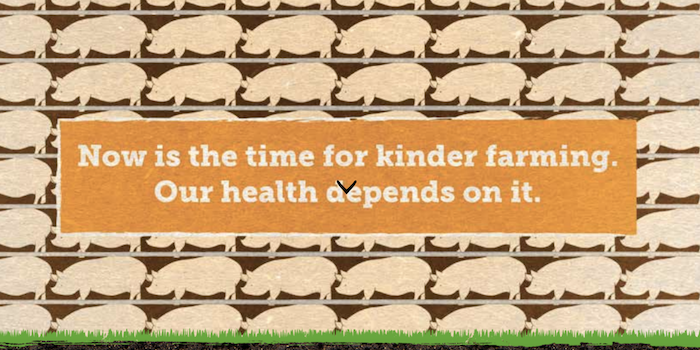The Responsible Use of Medicines in Agriculture (RUMA) alliance has expressed ‘surprise and disappointment’ over claims made about antibiotic use in farming in a fund-raising campaign by the Soil Association.
RUMA warned that the organic body’s stance could ‘set back the significant progress being made on reducing use of antibiotics across the UK farming industry’.
The SA’s fund-raising page on its website describes the current drive to reduce antibiotic use as a ‘once-in-your-lifetime’, opportunity to ‘make big and desperately important changes’.
It calls for this to be achieved through ‘kinder farming methods which improve the health and welfare of farm animals’.
The association claims to have had ‘moments of real impact’ in reducing antibiotic usage over the past 20 years, including a ban on antibiotics to promote the growth in Europe and on advertising of antibiotics direct to farmers.
“But in all that time, we have faced representatives of industrial farming, drug companies and Government regulators who have claimed that the use of antibiotics in farming is hardly contributing to the growing problem of antibiotic resistance when people get sick,” it says.
“But even this is now changing, as a Government-commissioned report recently concluded that there is ‘compelling’ evidence that antibiotic resistance does transfer from farm animals to humans via food and through the environment. Both the World Health Organisation and the European Food Safety Authority agree.”
Incorrect facts
RUMA chair Gwyn Jones said he was taken aback, ‘not just by the incorrect facts and lack of knowledge of industry progress in the campaign messages, but that the antibiotic resistance issue could be used as a vehicle to promote philosophical, commercial or fundraising objectives’.
He criticised the ‘divisiveness’ of the campaign. “Denigrating certain farming systems is likely to alienate and demotivate the vast number of first-rate conventional farmers across the UK who are already implementing change in order to play their part in tackling this global issue. It’s probably not an approach many of our excellent organic farmers will feel entirely comfortable with either.”
He stressed that antibiotic resistance is a ‘One Health’ issue across human and animal medicine with good progress being made in both.
“Efforts to divide along these lines too, when we should all be working together, are unhelpful,” he added.
He challenged the campaign group to end its obstructive approach, work with the wider agricultural industry on areas of mutual interest and acknowledge where headway was being made.
He described the 10% reduction in antibiotic sales into the farming industry in a single year, a halving in antibiotics prescribed in feed for young pigs, and poultry meat companies stopping all use of preventative antibiotics as ‘remarkable progress and tremendous commitment from all involved’.
Mrs Jones concluded: “Attacking farming systems under the guise of campaigning to reduce antibiotics could lead to unintended consequences, such as the replacement of high quality and safe British food with cheaper imports.”
Soil Association chief executive Helen Browning was recently forced to to issue a ‘huge apology’ over a Soil Association tweet that suggested conventional farmers were ‘abusing’ animals.




